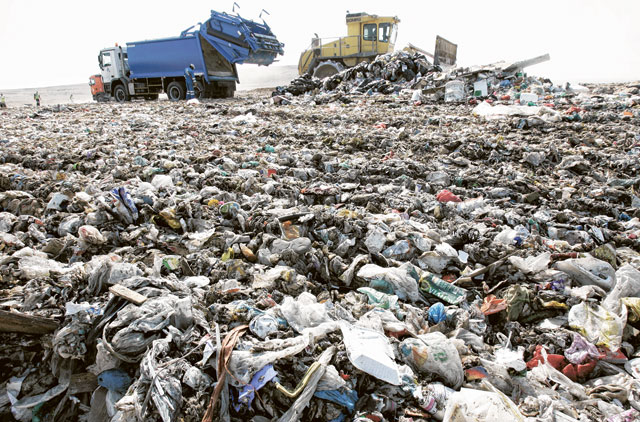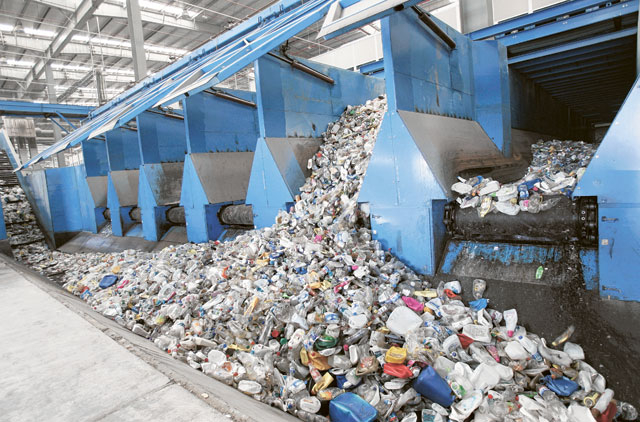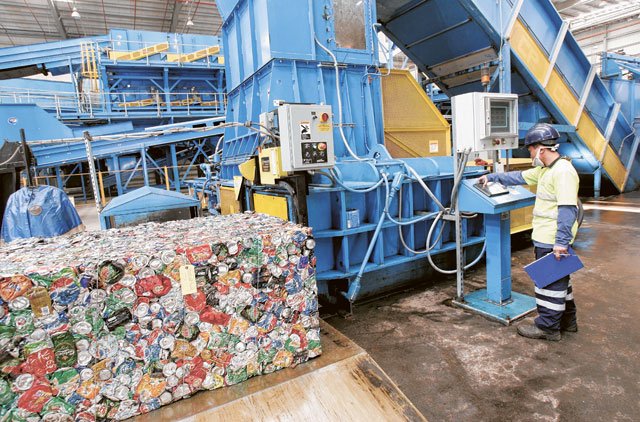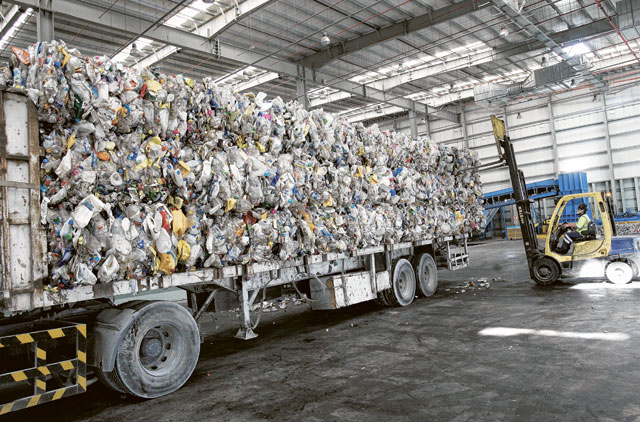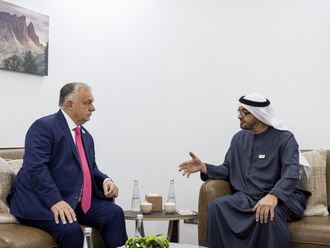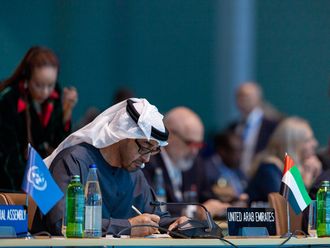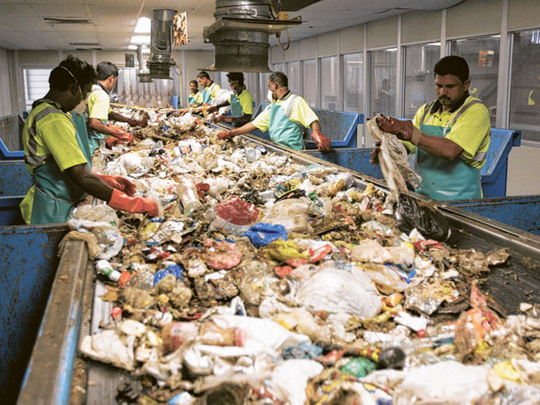
Dubai: The UAE's mounting garbage problem has kicked up a debate among officials and environmentalists, some of whom believe it is high time to implement a pay-as-you-throw scheme (PAYT) in which people would be asked to pay for every bag or kg of trash they throw, just as they pay for every litre of sewage or kilowatt of electricity.
Radio 2: Nasreen Abdulla reports on the mounting waste problem in the UAE
* Audio supplied by Radio 2
Each person in the UAE generates around 2.5kg of waste per day. That's over 900kg in one year, 400kg more than the annual waste generated by the French or Italians. The shocking revelation has led to a sense of urgency about how to tackle the rising trash heap on swelling landfills, the ultimate destination of most things we discard.
Landfills are hidden from public view but are dubbed as "unexploded bombs" as they produce toxic, potentially dangerous and climate-change gases like methane and carbon dioxide.
For years, officials and environmentalists have used gentle persuasion and an end-stage segregation to encourage reuse and recycling.
Take for example Al Saj'ah, the main landfill in Sharjah off Al Dhaid Road. At 5am, a queue of garbage trucks rolls in and out. Inspectors check each incoming payload after it is weighed.
Surreal spectacle
The four square km patch of what used to be virgin desert makes for a surreal scene. It's surgically clean, alright, thanks to cosmetic touches of sand sprinkled over it.
But scratch the surface and it reveals a mountain of municipal solid waste (MSW), spread across several hundred square metres of "cells" of sand.
By closing time at 11pm, up to 1,000 trucks will have dumped 4,000 tonnes of waste - or an average of 120,000 tonnes per month.
Sharjah-based waste management company Bee'ah reckons that around 2.3 million tons MSW haves been stored in the facility since 2001.
Bee'ah's on-site material recovery facility (MRF) recycles up to 30 per cent of waste through manual and mechanical sorting.
A trio of heavy machines - a 50-tonne compactor, a shovel and bulldozer -- work on the fresh part of the landfill, where thousands of gulls and flies wait for the endless stream of trucks carrying their next meal.
At 1,360 tonnes daily, the MRF's capacity is the largest in the Middle East, fed by Tandeef, Bee'ah collection division. Inside the 220,000-square-foot, four-storey site, bales of plastic bottles, paper and metal are packed into trucks at the facility bound for local recyclers.
Many more items that end up in the landfill would have been easily recyclable - metal cans, plastic bags, paper and kitchen waste.
"The worth of recyclable materials in an average-sized waste bag generated by a typical household is approximately Dh1.50," said Georges Barakat, marketing manager of Bee'ah.
The company also recycles construction and demolition waste (CDW) - which accounts for 67 per cent of waste in Sharjah.
Trash to cash
Industrial or commercial users are charged Dh50 for every tonne of waste -- or Dh0.05 per kg -- dumped into Al Saj'ah landfill.
Currently, municipalities charge a flat "housing fee" for services such as waste collection.
This may need to change, said Dr Mohsen Aboulnaga, founder of the Emirates Green Building Council. Aboulnaga believes a "phased" implementation starting with an awareness drive to segregate and curb waste should be capped by a PAYT programme.
"This would make people think twice about throwing recyclables," said the US-trained expert on green building designs. He added: "It would also need a tougher legislation," said Aboulnaga, adding that money tends to be the only "language" that people understand.
Official figures show that Dubai's trash generation tripled to nearly four million tonnes from 2000 to 2009, a 16 per cent annual increase.
Habiba Al Marashi, founder and chairperson of non-government Emirates Environmental Group (EEG), who has been running conscience-and-education campaigns across the UAE for 20 years, said if a unit pricing programme is the best way to curb waste, then so be it. "If there's a well-studied, well-structured PAYT plan that would lead to a reduction of the amount of waste going into landfills, I'm all for it," said Al Marashi.
As waste management costs go up - so does the environmental costs. And with the 2012 Kyoto deadline for C02 emissions reduction, the challenge will become more pronounced for greenhouse gasses to be tapped from landfills.
Dubai Municipality Director General Hussain Nasser Lootah said last year that waste collection is a "big job" and a PAYT scheme had been mooted, but said implementing it on a street-by-street basis remained a challenge.
This January, the Dubai Municipality has started issuing permits for the entry of vehicles used to transport solid waste to the emirate's landfills. In any PAYT scheme, pricing is key, said Dulsco operations manager Ajay Kumar, who added they currently pay Dh10 per truck for disposing waste in Dubai. "If people are charged for liquid waste (sewage), then why not solid waste, too?" said Kumar, "but it must be priced reasonably, or it may lead to illegal dumping'."
WEIGHING THE EVIDENCE
A PAYT scheme may be implemented in two ways - charging residents a fee for each bag or can of waste or billing them based on weight. The less individuals throw away, the less they pay.
Reinhard Wilkes, senior landfill operations manager of Bee'ah, said PAYT boosts household-level segregation.
"This is the big chance for UAE to implement legislation that would make residents think twice about dumping unnecessary waste," he said. "It (source segregation) is the only way forward. It's the most successful practice in many countries," said Wilkes.
Today, more than 8,000 communities in various parts of the world use some sort of PAYT scheme (see box on page 6).
Janine Sheard, who advocates the Japanese "Bokashi" home composting system, agrees to a unit-based charge by treating trash services just like sewage, electricity, and water.
"Maybe the only way forward is to use a disincentive -- charge for garbage collection -- but at the same time add an incentive."
"Pay per use is not popular," said Dr Usama Al Alami of Zayed University and chief executive of Environmental Impact Network (Zein). "But like Salik (road toll), it is acceptable. The challenge is in the implementation".
"Yes, a tipping fee would help reduce waste generation drastically," said Ahmad Lootah, business development manager of Enpark, Dubai's environment and energy free zone. "But it it should be a part of an overal solution to reduce, reuse and recycle waste."
Karim Aly, director at paper recycling firm Ecobility, appeals to one's conscience. "The sustainability of local recycling ultimately depends on there being a consumer market for recycled goods. Recycling is a great first step. But we must also make an effort to continue the demand for recycled products by actively choosing to buy them, as in ‘closing the loop'."
Sabika Shaban, in charge of Lucky Group's marketing, suggested giving a strong incentive to increase recyclable collections.
"Such incentives are not only self-created, but also require schemes designed by local authorities -- such as individual home garbage collection, garbage bag limit per home -- to encourage homeowners to dump less and recycle more."
PAYT schemes, however, may be a long shot here.
"Sustainability is down to the conscience of individuals," said James McGuire, Bee'ah's operations director. "If the public is well informed, it helps change individual behaviour," he said. He said charging households may be "impractical" - and trigger neighbours dumping waste into each other's bins at night. Even with the best waste management schemes, the landfills are here to stay. Burning trash would still create 25 per cent ash from the weight of raw waste that needs to go somewhere. "There is no such thing as 100 per cent recycling. We will always need landfills. The key is to cut the amount of waste that end up here," said Wilkes.
- 2.5 kg is the amount of trash each UAE resident generates daily
- 16 per cent is the annual increase in the amount of trash generated in Dubai
TRY IT AT HOME
- Set a bin aside for recyclable items (paper, plastic, metal and aluminium) and see how much you accumulate in a week.
- Weigh the waste you throw away daily
- Compare the remaining recyclables (it's about one-third)
- Throw the recycables in the proper collection bins near your house
Pay as you throw?
- charging residents a fee for each bag or can of waste or billing them based on the weight
- charge for garbage -- but add an incentive (such as discount coupons for those who compost)
WHO IS CHARGING FOR WASTE?
A form of PAYT started as early as the 1930s in San Francisco, California. Today, over 7,000 communities in the US and 200 in Canada have PAYT schemes. Many European cities have started it since the 1980s and an increasing number of Asian communities are implementing it, with Japan leading the way with over 900 PAYT communities.
North America
US - 7,000 communities
Canada - 200 communities
Europe
Most communities today (starting with Austria in 1945) Dresden, Germany (1980s, using secure electronic identification system)
Asia
Japan - 954 municipalities;
Taiwan, Korea, Thailand, Vietnam, China, Taiwan, Philippines (Olongapo)


